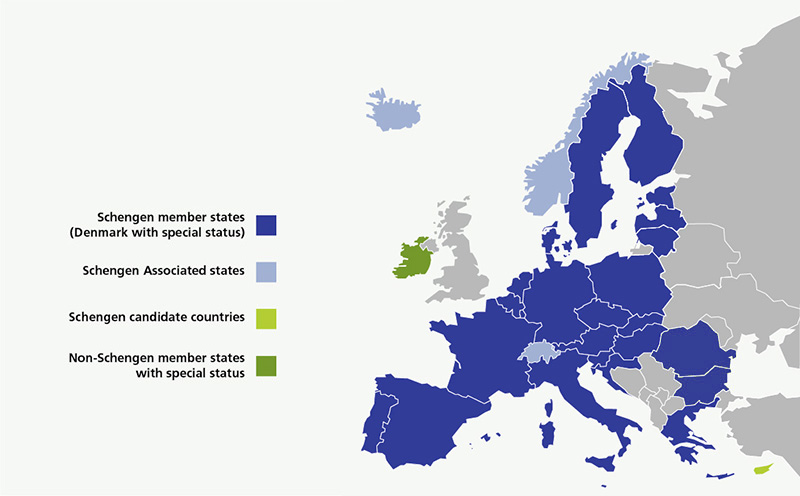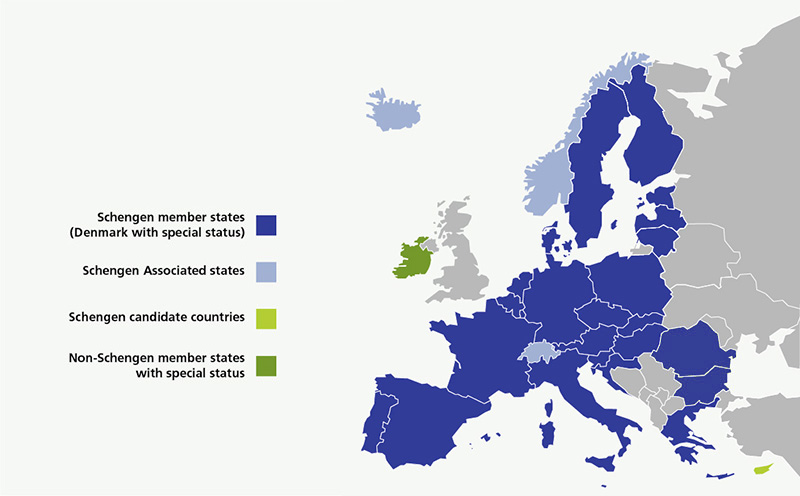Switzerland has been a member of the Schengen Area since 12 December 2008.
Applicable to all Schengen member states, the Schengen Association Agreement stipulates that short stays may not exceed 90 days in any 180-day period. This agreement is specifically intended to facilitate the travel of tourists, visitors and business travellers for these brief periods of stay.
The agreement also stipulates that
- as a rule, there are no border checks on persons at the internal borders of Schengen member states;
- persons wishing to cross the external borders of the Schengen area shall be checked in a uniform fashion;
- all Schengen member states shall apply the same entry requirements;
- all Schengen member states shall apply a common visa policy for short stays.
At the same time, a series of measures have been adopted to improve judicial and police cooperation in the fight against crime. These include:
- adoption of the Schengen Information System (SIS II) to modernise the exchange of information on persons and stolen property;
- simplification of mutual legal assistance;
- cooperation in the fight against drug trafficking.
Information about customs and goods inspection
The Schengen Association Agreement has no impact on the activities of Swiss customs. Since Switzerland is not a member of the EU Customs Union (EUCU), customs and goods inspection will continue at Swiss external and internal borders. In connection with these customs and goods inspections (e.g. to ascertain the origin and destination of goods) and for personal protection, checks on persons may also be carried out if necessary.
Country |
EU Member State |
EFTA Member State |
Schengen Member State |
|---|---|---|---|
Austria |
X |
|
X |
Belgium |
X |
|
X |
Bulgaria |
X |
|
X |
Croatia |
X |
|
X |
Cyprus |
X |
|
|
Czech Republic |
X |
|
X |
Denmark |
X |
|
X |
Estonia |
X |
|
X |
Finland |
X |
|
X |
France |
X |
|
X |
Germany |
X |
|
X |
Greece |
X |
|
X |
Hungary |
X |
|
X |
Iceland |
|
X |
X |
Ireland |
X |
|
|
Italy |
X |
|
X |
Latvia |
X |
|
X |
Lithuania |
X |
|
X |
Luxembourg |
X |
|
X |
Malta |
X |
|
X |
Netherlands |
X |
|
X |
Norway |
|
X |
X |
Poland |
X |
|
X |
Portugal |
X |
|
X |
Principality of Liechtenstein |
|
X |
X |
Romania |
X |
|
X |
Slovakia |
X |
|
X |
Slovenia |
X |
|
X |
Spain |
X |
|
X |
Sweden |
X |
|
X |
Switzerland |
|
X |
X |
The Schengen area is comprised of twenty-five member states of the European Union (EU) and four member states of the European Free Trade Association (EFTA). Schengen member states have adopted uniform rules on short stays of no more than 90 days in any 180-day period.
Special status of Denmark, Ireland and the United Kingdom
These three EU member states hold special status within the Schengen system.
In Denmark, short stays of 90 days in any 180-day period are not governed by EU law but rather by national law. Thanks to an opt-out clause, Denmark may decide on a case-per-case basis which of the measures under the Schengen Association Agreement it wishes to adhere to.
In Ireland and the United Kingdom, Schengen rules on short stays of 90 days in any 180-day period do not apply. These two countries do not take part in cooperation efforts relating to the common visa policy and have not phased out border checks on persons. These two countries therefore do not belong to the Schengen Area. However, they retain the right to become involved in these areas at any time.
Last modification 20.03.2024







